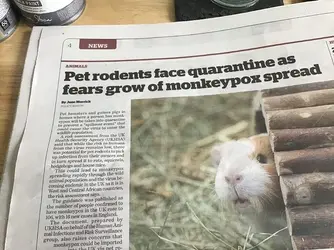In the I newspaper today it states that if a person is infected with monkey pox then any rodent pets( guinea pigs, rats, hamsters and exotic pets) will be removed and quarantined for 21 days by UKHSA ( the UK human and animal infections and risk surveillance ) and only released if they test negative. Dogs and Cats will stay in the infected persons home under house isolation. The UKHSA are concerned monkeypox could be imported and/ or spread to native wildlife.
Do we have any rights ? I would be very loathe to let a government dept look after our guinea pigs, rats, hamsters etc !
With bird flu chickens were kept at home/ barns just unable to go outside.
Very worrying ……
Hi
Personally, I would not worry but be glad that the government have learned their lesson and are giving thought on how to handle this before it has already become a wide-spread runaway problem.
Established pets pose no risk unless somebody in the household becomes acutely infected and is in very close contact with them (kissing, handling, cage cleaning - don't do the first; always wash/disinfect your hands after any handling/cleaning; use a different towel/lap pad as a washable surface for grooming and handling on your body to protect your own clothing and use gloves for any cleaning in your normal daily hygiene anyway). These normal daily hygiene measures for any pet owners can limit the risk of you passing anything onto your pets in the first place.
Any measures in the actual case of an acute monkey pox infection will have to follow government guideance/protocol for the country you are living in; in this case the wider implications (i.e. causing death or long term problems to other people by passing the infection on) surpass your personal interests. The initial lockdowns in Covid (human to human) while we were without any vaccine protections were the equivalent measure to a potential pet quarantine in affected monkey pox households.
Please keep in mind that monkey pox is much less infectious than Covid and needs prolonged close contact with an infected person or their belongings (like shared bedding or towels) - much more so than with Covid. It is much less likely to spread as widely as Covid but will more likely remain on a level with SARS or MERS - successfully contained pre-Covid pandemics. But of course we are much more jittery in the wake of Covid and some of the press will pander to that.
Should it really become a more widespread problem (in case it somehow spreads to rats or other wild rodents), then an effective smallpox vaccine is already on stand-by for large production so a vaccination campaign would be much more quickly available than with Covid because research into and development of a new vaccine is not needed. Monkey pox is also nowhere near as deadly as Covid, even though it should not be underestimated.
The good news is that in this case a sizeable part of the population that is at higher risk of complications resulting from the infection, the elderly, have actually been vaccinated against smallpox in the mass vaccination campaigns of the 50ies and 60ies before smallpox was declared eradicated and they do have life-long protection from the single vaccination needed. This will also act towards slowing any spread; we are not starting with a zero level of protection as a population, unlike with Covid.
And unlike Covid, a smallpox vaccine is also effective in the early stages of an acute monkey pox infection so it is going to be much easier to get on top of any outbreak, and as a result you are much less likely to ever be directly affected by it.
It is more realistic for the longer term that anybody travelling to or arriving from a country with monkey pox will either have provide proof of a smallpox vaccination or will be given one upon entry into the country in line with other infectious tropical diseases regulations.
You can find our common sense good practice hygiene tips in this guide here, which deals with the practical measures during infectious owner illness and with inter-species transmission. There is quite a bit you can actually do to minimise any potential transmission risks in your normal daily routine:
Contagion - Inter-species transmission and pet care during owner illness/pregnancy (incl. Covid)
PS: Please keep in mind that every species-jumping illness needs to be evaluated on its own merits and its own potential transmission risks. The transmission risks and angles are all different in each case.
In the case of bird flu, the measures taken are there to prevent infected migrating birds spreading the flu onto farmed and domestic birds and only secondarily onto humans. In the case of monkey pox, the infection will have to be passed from humans to rodents and then be transmitted back to humans, so it is a very different scenario which requires different measures to break transmission.
